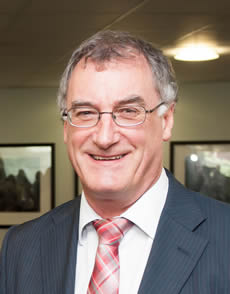Peter Thirkell - a journey of curiousity
How marketing reconciles with sustainability and new technologies are now driving Emeritus Professor Peter Thirkell's thinking, even after he has "retired".

Emeritus Professor Peter Thirkell
From a student in the 1970s when he first discovered marketing, to his recent change in focus with semi-retirement and part-time teaching of marketing honours, Peter Thirkell's story reflects the story of the School of Marketing and International Business (SMIB).
For around 21 years Peter has influenced through leadership, teaching, direct supervision, diplomacy and advice – including four years as founding Head of School, and three years as Dean of Commerce.
Last year he decided to end full-time teaching and academia to pursue other projects, but that doesn't mean any loss in curiosity; Emeritus Professor Peter Thirkell is just finding other ways of challenging contemporary thought.
I am hooked:
"Back in the 70’s an American guy turned up advocating something everyone kind of thought was advertising. It sounding interesting and I was curious so I signed up to discover that yes, advertising was in there but it was so much more.
"It is the endless possibilities and the fact that the discipline [marketing] is quite hard to define that continues to fascinate me."
Implementation is key:
"The challenge with planning and strategy is not only found in achieving quality of thinking but also in finding the right people to execute. Working in industry really brought it home to me that of the key to successful planning and strategy is implementation."
Persistence pays:
"In 1989 I was appointed Professor of Marketing within the School of Business Policy and Management with about 55 academics. However I wasn’t that happy, as a Professor of Marketing, I wanted an actual School of Marketing. So I argued for and lost that battle, but I quietly persevered.
In the end Neil Quigley (PVC at the time) said "why are you always on about this school of marketing?" and I said, I think you need it if you want to flourish and have a distinct profile ….
Enter international business:
At the time there were relatively few departments of international business so we thought there could be an opportunity here. I think there still is. We’re one of only a few universities in New Zealand with a nominated school or department of international business. I think that is important.
"Slowly an undergraduate programme for IBUS was developed and that was a big undertaking. It was exciting and it was also a little unnerving because we had to tool up and we were quite short-staffed. Student numbers took off more than any of us expected because it coincided with the increase in international students from China.
"We were fortunate that this wave came along that we could ride. It was a bit like riding a slightly run-away train for two or three years"
On marketing…and sustainability:
"Some would say that marketing has done its job, it has stimulated demand and in some ways we’ve got too much demand so let’s shut it down. But I can’t really see that happening. The question becomes: Can we reconcile what we might think of as the core elements of marketing with sustainability imperatives?
"Marketers need to rethink the basic frameworks, overlay another couple of sets of operations and ask questions around customer focus. Is customer focus still relevant in sustainability? Absolutely! But what do we mean by customer focus and how do we integrate it with sustainability?
"Our approach needs to be holistic; it needs to go outside the boundaries of the enterprise. We’ve seen bits of this already – triple bottom line is one attempt and governments are now looking at quality of life and happiness.
"The marketing concept still holds up but we have to rethink how we define and practice the primary elements. It’s a rethinking of the basic frameworks we have been using."
And the question of value?:
"Yes, value is still at the heart of it, so in that sense I’m still a traditionalist and a bit of a fan of Peter Drucker. One thing I would add to Drucker’s original thoughts though is to emphasise the question of timeframe. If design is handled well there are implications because value, particularly for a consumer durable, is timeframe bound.
We all know about planned obsolescence, the vagaries of fashion and so on, but for true sustainability some of those things need to change. But do we regulate change? Or do we look for different opportunities?
"There are creative solutions but I think business may need to partner with public policy around these questions."
On databases and digital:
"I loved the emergence of databases and the move to digital, the constant change in channels and their fragmentation I also find fascinating. If a student asked I’d still say stay close to the database. Pay attention to the changes in channels, channel structures and networks."
The price of interruption:
"What is the interruption price today’s marketers are prepared to pay for getting something? Marketers using mass advertising are still persevering with an intrusion model and I don’t quite understand why.
"There is a legitimate place for creating awareness but it needs to be done in a more sympathetic way. How we become more sympathetic to consumers is a key question facing future marketers."
There and back again:
"Quite a number of our postgraduate students do end up off-shore. I don’t mind as long as they come home again. Stay and learn as much as you can but please, please come home again at some stage. We still need you. We need you here as much as anywhere!"
